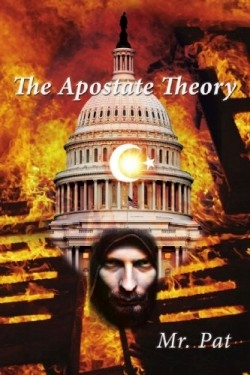
The Apostate Theory
“The Americans had spit in Allah’s face when they chose the Apostate over the woman…The Twin Towers would soon no longer be America’s worst nightmare,” the author writes.
The Apostate Theory takes readers into a terrorist organization’s plan to detonate a nuclear weapon on American soil. The impetus for this attack is the election of Barack Obama, who some Muslims view as an apostate—a person born to a Muslim father, but who doesn’t accept the Islam faith.
Author Mr. Pat was born in America, but lived and worked in Egypt for some time. He has written several books about terrorism and life in the Middle East. In The Apostate Theory, Mr. Pat’s characters experience growth and significant change throughout the story, but the ease and speed at which they do so makes it hard to believe. For example, Ayeza is a Pakistani woman who was raped and almost murdered as a child bride. She is rescued by the American military and taken in by a military couple who raise her in Germany. Due to Ayeza’s traumatic childhood, she is leery of men and doesn’t date, even as an adult. However, when she is paired with a CIA operative with a reputation as a womanizer, she manages to fall in love with him and consummate the relationship within a matter of months. Despite her past, she shows an uncharacteristically cavalier attitude towards sex. She tells her companion, “The shower is big enough for two…We have time.”
The Obama administration is portrayed superficially as anti-military and pro-Islam. The exposition that conveys this is stilted, making it sound like opinion rather than information given to move the plot forward: “In a gesture of appeasement, the first order of business was for the Apostate to…close the Guantanamo military prison.”
Keeping up with the characters’ titles and names is often a challenge. The titles of Admiral, General, Captain, and Colonel are used with multiple characters. Sometimes the title accompanies a name and sometimes it is used alone to refer to a character.
Although The Apostate Theory has a gripping storyline and includes meticulous detail about military operations, it falls short on believable characters and dialogue. With more action and dialogue to replace the large passages of exposition, the story could be more engaging.
Disclosure: This article is not an endorsement, but a review. The publisher of this book provided free copies of the book and paid a small fee to have their book reviewed by a professional reviewer. Foreword Reviews and Clarion Reviews make no guarantee that the publisher will receive a positive review. Foreword Magazine, Inc. is disclosing this in accordance with the Federal Trade Commission’s 16 CFR, Part 255.
